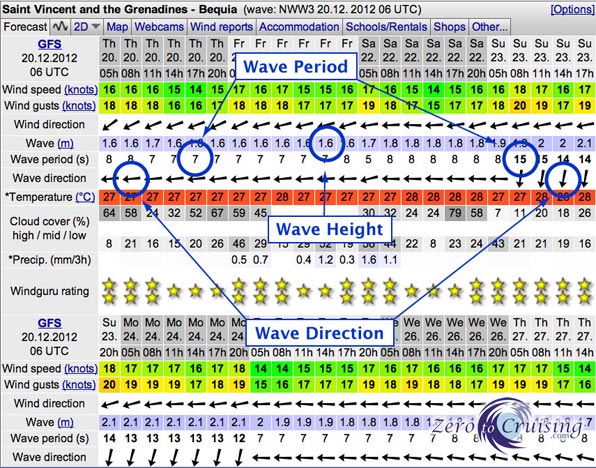It’s never just the wind to consider
When discussions of weather come up, specifically bad weather, people often tend to focus on the speed or the force of the wind. While that is most definitely a very important factor, boats can typically adjust their sails to account for increases and decreases in the wind. What they can’t as easily adjust for are changes to the sea state. Whether we have a good passage or a bad passage is almost always determined more by the sea state than it is by the wind. Contrary to what many newbies might believe though, the size of the waves is not the only important factor. Hand in hand with the size is the direction that the waves are traveling from and the amount of time between them, known as the frequency or the period.
As we are currently plotting our movements north, we have been paying extra attention to the forecasted conditions. If you remember the post I wrote about how the Christmas winds typically blow from a north-easterly direction, we have decided to make our next jump a big one, all the way to Dominica. If you take a look at the rough course lines in the image below, and imagine the wind blowing out of the NE, you’ll likely be able to determine why. We had, up until this morning, planned on leaving here early Saturday morning. The wind is forecast to shift to the east and given a primary course line of 355? T, we “should” have been able to have a decent sail.

But… (there’s always a but)
As I said, the wind is not the only thing to consider. Beginning on Sunday, while we would still be underway, a strong north swell is predicted. Interestingly, the period of the waves is quite long, 11 to 15 seconds. For those not entirely sure of what I mean by this, a long-period swell would be much like riding a roller coaster while a short period, 6-8 seconds, more like being on a bronco. I can’t actually recall that ever sailing directly into a swell like this and as such, I’m a little unsure of what it will be like.

Image source: Windguru
Of equal concern though is what the anchorage will be like when we arrive in Dominica. Prince Rupert Bay, like many of the anchorages on the western shores of the Caribbean islands, can get uncomfortable in times of northern swell. Take a look at the little chartlet of the Bequia anchorage below and imagine some waves piling in from the north. I’m sure you could figure out why we decided to move our boat up into the portion of the bay shown on the top of the image. I predict that by Sunday even this place will get uncomfortable and that the anchorage in Dominica will be even worse.

So, with that info, what to do? As of this moment (subject to change), we have decided to remain here for Christmas and depart on the 26th. The wind is still supposed to be in a favorable direction then, perhaps even more so. More importantly, that swell should have dissipated and our passage, and the anchorage we have planned to arrive in, should be safe and comfortable. There are certainly worse places to spend Christmas!

Can you find ZTC amongst the other boats?


Just to be technical (gotta use that engineering degree when I can )… “frequency” and “period” are actually inverses of each other. Frequency being how frequent something happens (like how many times per second (Hertz), per minute, etc.) and period being how long it takes something to happen. So if you’re talking frequency, you would say “the wave happens once every 7 seconds”, or 1/7,… and if you’re talking period, you would say, “it takes 7 seconds for a piece of flotsam to ride from the top of one wave to the top of the next”… or the time between peaks. Of course Zero to Cruising is crazy fast so we can’t say the period is the time it take’s Zero to Cruising to go from the top of one wave to the top of the next.
And while we’re at it, don’t confuse “wave height” with “amplitude”. Wave height is actually twice the amplitude of a wave.
Just sayin’. I know, I’m a nerd.
Scott
hehe… nice. Thanks for all that nerdy info.
As for our boat being fast, we were passed by every single boat on the water during our sail here. Yesterday I cleaned the bottom and removed about a bazillion barnacles so hopefully during our next passage we will move out of the extremely slow category and into the slow category.